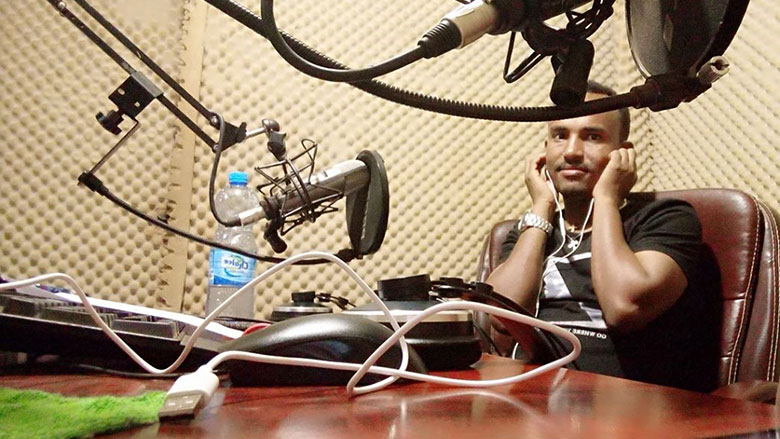ADDIS ABABA, January 25, 2021 – Arsi Negele is a rural community in the heart of Oromiya region where Alemtsehay Demissie, like many of her neighbors, struggled to get the drugs prescribed to her. With consistently low supplies at local clinics, often, the only option was to purchase them from expensive private pharmacies.
Since 2006, ESAP has used social accountability processes to help citizens local problems in basic services, such as health, education and water, with government and service providers to find a solution to improve their quality. In Arsi Negele, the community and its local government came up with a Joint Action Plan that addressed the problem in two ways: first, better monitoring by local clinics of drug stocks helped improve their supplies and, second, the city administration opened a public pharmacy where drugs are available to the community at affordable prices.
“Now, thanks to social accountability, there’s improved medicine availability at the pharmacy and it has reduced the time we spend in search of drugs,” said Alemtsehay, who serves as the women’s representative on her local accountability committee.
Global evidence confirms the impact of social accountability to improve the quality of service delivery, a component of good governance that relies on citizen engagement to hold government’s accountable.
“The COVID pandemic has made the importance of good health care supported by active citizen engagement even more obvious,” said Emily Weedon, World Bank Senior Social Protection Economist in Ethiopia. “People voicing their needs to government measurably improves the quality of these lifesaving services.”
At the beginning of 2020, the ESAP reached one-third of all woredas (districts) in the country, with activities in 317 woredas, such as those in Arsi Negele. Social accountability evolved as a largely face-to-face process throughout the country, where people gather in community meetings to express and discuss their collective concerns. However, since COVID-19, gatherings have become unsafe due to the risk of infection.
In the face of this challenge, ESAP found an innovative approach through the media to continue engaging citizens and actually expanded the reach of its social accountability efforts. Its new “Citizens on the Line” call-in radio show now reaches 729 woredas.
Officials use the radio shows to share accurate information on COVID-19 to a broad audience, respond to citizen’s questions and ensure their accountability. Citizens use the opportunity to express their views and concerns about the impact of COVID-19 on public service delivery and government measures that aim to curb it. Shows have covered specific topics related to COVID-19, such as use of face masks, public transport and navigating the holidays. Special outreach has helped ensure that persons with disabilities can participate as well.
The program is also working to engage with women and on issues related to female empowerment. In Addis Ababa, nearly half of callers are female but, nationally, they represent only about 10% of participants. However, certain topics appear to draw more interest from women: the highest female call-in rates are for shows on the impacts of COVID-19 on the economy and on education.
ESAP is an initiative under the Enhancing Shared Prosperity through Equitable Services (ESPES) project, a Program-for-Results operation in Ethiopia with a total financing of $1.3 billion. ESPES supports building human capital through the government’s pro-poor, basic services. Decentralized delivery of these services helps narrow differences in per capita expenditures on education and health in favor of remote, food-insecure and pastoral woredas.
Independent evaluation of this spending, particularly spending with citizen oversight, shows substantial returns in investment. In education for example, an increase of $1 per capita in spending by woreda resulted in a 3.7% increase in the net primary enrollment rate within that woreda. In health; every additional $1 of per capita spent by the woredas was associated with a 7.5% increase in the contraceptive prevalence rate, a 12.4% increase in deliveries by skilled birth attendants, and a 4% increase in antenatal care.
Investing in human capital, the health, education and skills of citizens, is a central pillar of the World Bank’s “build back better” response to the pandemic.
“The long-term impacts of the COVID-19 require redoubling efforts and innovations to ensure that the availability and use of services translate into economic and human development outcomes. This calls for better promoting equity and social inclusion while bolstering state capacity and accountability,” said Ousmane Dione Country Director for Ethiopia. “The next generation of the World Bank’s support to the government’s services will focus on basic literacy and childhood nutrition, the foundation for lifelong learning and wellbeing. Social accountability will be a central tool to improve quality and promote uptake of these services necessary to realize these goals.”
ESAP is currently financed by the World Bank and a Multi-Donor Trust Fund (MDTF) with contributions from Austria, the European Commission, Ireland, Sweden, the United Kingdom. With oversight by the Government of Ethiopia and the donor partners, the MDTF supports demand side activities implemented by VNG International as the program’s Management Agency in partnership with clusters of local Civil Society Organizations. Complementing the MDTF, IDA resources support the Government of Ethiopia’s plan to institutionalize Social Accountability including building supply side capacities.

